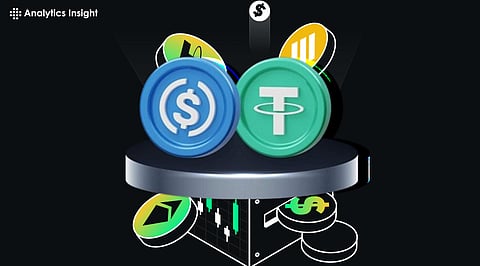

Stablecoins have become integral to the cryptocurrency ecosystem, offering stability and facilitating transactions.
Regulatory developments are shaping the future of stablecoin adoption and integration into traditional finance.
The top stablecoins of 2025 combine transparency, compliance, and innovation to meet the evolving needs of users and institutions.
In 2025, stablecoins have emerged to represent an essential part of the cryptocurrency ecosystem, providing a link between the volatility of digital assets and the stability of traditional fiat currencies. With a market capitalization of more than $246 billion and more than $28 trillion in transactions in the previous year alone, stablecoins aren't just reshaping the financial landscape but also drawing the attention of regulatory authorities, investors, and institutions.
Tether remains the largest stablecoin by market capitalization, with around 62% of the market share. This means that it is very commonly used on exchanges and DeFi platforms, demonstrating its liquidity and availability.
Reports show that Tether holds $99 billion in U.S. Treasury bills, so it is a major holder of U.S. government debt.
Circle, the issuer of USDC, has established itself as an accurate, open, and regulated business. The company's public-company IPO application with the SEC, ability to partner with large regulated companies like JPMorgan, and ability to demonstrate that stablecoins can be integrated with conventional finance demonstrate its commitment to the use of stablecoins in the regulated industry.
Its existing market cap growth has contributed in part to stablecoins' total $13B market capitalization growth.
DAI is a decentralized stablecoin governed by the MakerDAO protocol. It maintains its peg by being backed with various cryptocurrencies in an overcollateralized way. Although the market continues to fluctuate, DAI remains a go-to decentralized option for DeFi users looking for a stablecoin alternative.
PYUSD, created by PayPal, uses the company's vast user base to accelerate adoption as a stablecoin. It plugs into PayPal's ecosystem to allow for simple transactions and establishes a bridge between traditional finance and digital currency.
Also Read: What is Driving the Growth of Stablecoins in 2025?
Managed by Paxos Trust Company, USDP is a regulated stablecoin with cash and cash equivalents reserves. Its emphasis on regulatory compliance and transparency makes it a reliable option for users prioritizing security and oversight.
FDUSD is enhancing its standing as a potential reliable stablecoin with good security protocols and regulatory compliance. It also strongly emphasizes transparent operations and user trust, which undeniably makes it a serious challenger in the stablecoin market.
Ethena's USDe has risen to be a leading stablecoin, with a market cap of $620 million to $6.2 billion in early 2025. The rapid adoption rate is due to its innovative approach to stability; it can also be integrated onto more than just Ethereum and is beginning to be built into the blockchain's application/architecture.
TUSD offers real-time attestations of its reserves, providing transparency and trust to its users. Focusing on regulatory compliance, TUSD is utilized in various trading and lending platforms within the crypto ecosystem.
PAXG is a unique stablecoin backed by physical gold. It allows users to own and trade gold digitally. Each token represents one fine troy ounce of gold, combining the stability of precious metals with the flexibility of cryptocurrencies.
USD1, launched by World Liberty Financial, has entered the stablecoin market with significant backing, including a $2 billion investment deal involving Binance. Positioned as a fully backed, dollar-denominated stablecoin, USD1 aims to compete with established players by leveraging strategic partnerships and institutional support.
Also Read: Stablecoins Take Center Stage: Solana's $13 Billion Opportunity
Stablecoins are attractive to both individual users and large institutions because they provide increased stability for the generally turbulent crypto market.
Regulatory developments, such as the proposed STABLE Act in the U.S. and the GENIUS Act, stand to lay out clear guidelines to govern the issuance and operation of stablecoins and thus gain acceptance and integration into the mainstream financial system.
As the crypto market continues to develop, stablecoins are set to play a critical role in connecting the digital asset economy to traditional finance. With their stability, transparency, and regulatory compliance, the best stablecoins of 2025 will positively affect regulating transactions and the future of global finance.
